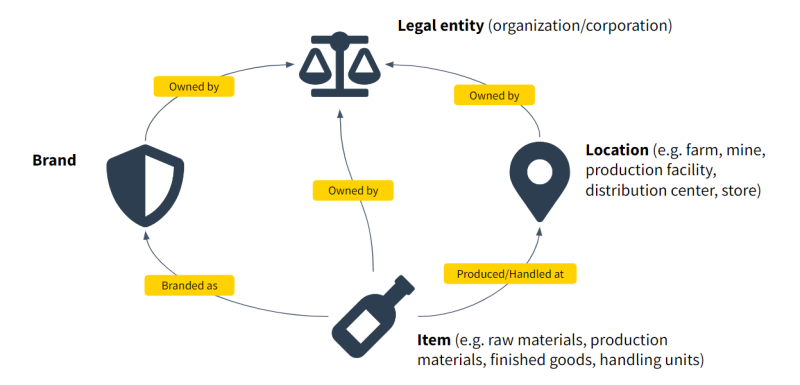ID - Identifier Types
Identifiers
Identifiers are essential to accomplish autonomous communication between machines across the entire value network. But just like with data standards, there are also multiple identifiers per key entity. That is why IMDE will also support multiple identifiers per entity. Depending on the industry or territory, different identifiers can be used to exchange data.
Identifier types
Item Identifiers
Items cover all Physical items produced. Check: Can be transported by for example boat, plane, truck or car.
Item Identifier types:
- GTIN standard by GS1 for Trade Items, covering finished goods and handling/shipping units
- UMID (Unique Material Identifier, based on UUID), used for exchanging data on raw materials, components/subassemblies, products and packaging components.
Legal Entity Identifiers
Legal entities like organizations and corporations. Check: Can be taken to court!
Legal Entity Identifier types:
- Ticker Symbol (only for listed companies)
- LEI (Legal Entity Identifier)
- EBSI Verifible credentials
- D-U-N-S number (Data Universal Numbering System)
Location Identifiers
Locations like farms, product facilities, distribution centers and retail stores. Check: Can be visited or can be found on Google Maps
Location Identifier types:
- GS1-GLN Global Location Number Key=GLN, example: 8719328024224 link
- What 3 Words Geolocation Key=W3W, Example: voted.rooftop.luck link
- Open Supply Hub Key=OSH, example NL2023317VTT386, Link
- True-code for identifying locations/facilities. Key=TC
Brand Identifier
Product branding is the application of branding strategy principles to a specific item or product. It's the associating of a symbol, name, and design with a product to create a recognizable identity for that item.
Brand Identifier types:
- Global Brand Identification Number standard for identifying brands. Key=GBIN, Example: 1232172669 link
Person Identifiers
- -
Animal Identifiers
- -
